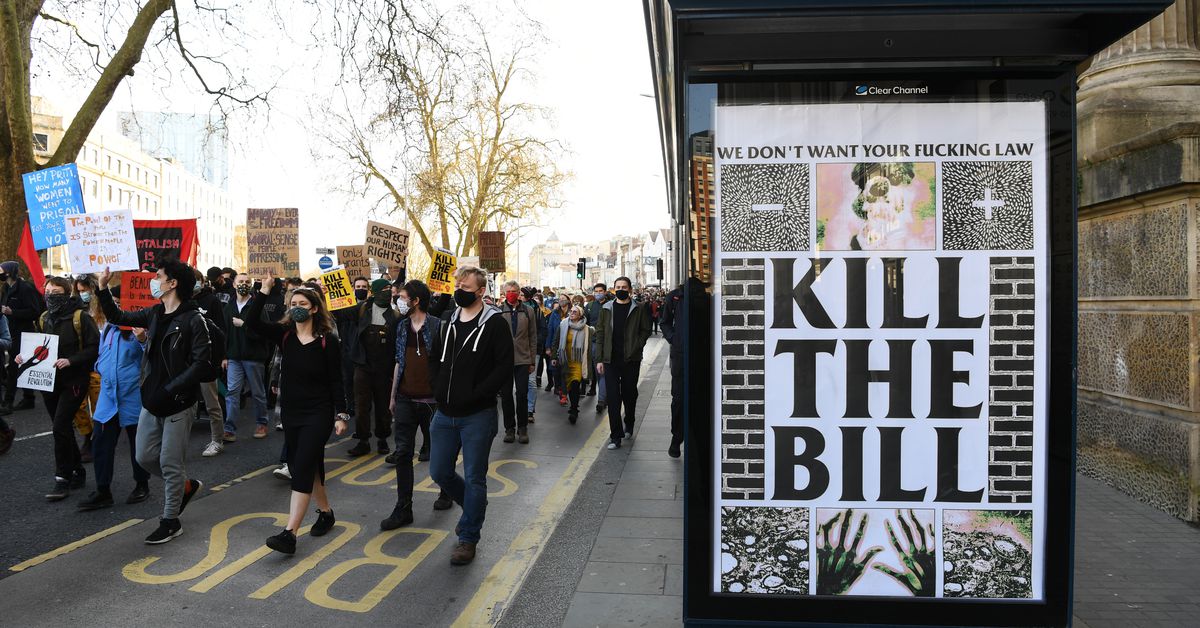Thousands of protesters marched through Britain on Saturday in protest against a massive new police bill that would create new restrictions on protests in England and Wales and impose heavy fines for failing to follow police instructions.
The bill, officially known as the Police, Crime, Penalties and Courts Project, was introduced in early March and has since met widespread resistance in England and Wales. It also includes sentencing and court reforms, among other changes, but protesters are specifically outraged by the proposed new police powers in relation to the protests.
If the bill is approved, according to the BBC’s Dominic Casciani, the police will have the authority to impose the start and end times of the protests, as well as noise limits – even if it is just one person protesting.
In addition, Casciani writes, the bill would criminalize the violation of restrictions that protesters “‘should’ have known, even if they did not receive a direct order from an official” and “intentionally or recklessly causing public discomfort”.
According to Labor MP Jeremy Corbyn, the former party leader, the bill “effectively criminalizes peaceful protest”.
“The right to protest is at the heart of a democratic society,” said Corbyn in a video on Friday. “It is part of who we are. And together, we will win over Boris Johnson’s dangerous proposal to ban the protest. “
This weekend’s “kill the bill” marches are not the first. According to the Guardian, Bristol, in southwest England, has seen at least five protests in the past two weeks, including one that became violent and saw at least two police vehicles set on fire in early March.
Nothing on the same scale has been reported so far on Saturday, but according to Sky News, at least 26 protesters were arrested in London after a clash with the police.
The UK is in the middle of its own debate about policing
As the New York Times explained at the end of last month, the bill comes at a delicate time in the UK. Sarah Everard’s kidnapping and murder in London last month, and the subsequent muffling of a vigil in honor of Everard for violating Covid-19 restrictions, put a debate over the role of the police in the front and center of the UK.
A London policeman, from the same police force that interrupted the vigil, was charged with the murder of Everard.
The country also saw its own Black Lives Matter movement last summer, following the death of George Floyd in Minneapolis. Protesters across the UK took to the streets to protest racism, inequality and police brutality and, in Bristol, a crowd knocked over a statue of slave trader Edward Colston and threw him into the harbor.
In London, a statue of former Prime Minister Winston Churchill was also spotted during the summer.
Bristol, England: Protesters dropped a statue of Edward Colston, a 17th century slave trader, and threw it into the harbor. It has been recovered and will be placed in a museum 4 / pic.twitter.com/ZZ5rPst6YZ
– Reuters (@Reuters) June 12, 2020
A clause in the policing bill currently pending in Parliament specifically increases the penalty for damage to such statues. According to the BBC, the measure “clarifies that damage to memorials can lead to up to 10 years in prison”.
In response to this provision and Everard’s murder, protesters “kill the bill” marched with signs saying “10 years for protest, 5 years for rape,” according to the Guardian. On Saturday, according to the AP, protesters shouted “Frightened women everywhere, police and government don’t care!”
Despite protests, the bill has moved forward in the UK Parliament with the support of Prime Minister Boris Johnson’s Conservative Party. In mid-March, it approved its first vote in the House of Commons, 359 votes to 263, and the measure was referred to the committee.
According to the New York Times, the conservative government hoped to take advantage of the outrage over Everard’s death to approve the bill, but recent opposition seems to have changed that. The committee’s process was postponed until the end of the year, reports the Times, while protests and criticisms from the labor opposition continue.
“Sarah Everard’s tragic death prompted a national demand for actions to address violence against women,” said David Lammy, a labor parliamentarian and parallel secretary of state for justice, in March. “This is not the time to take poorly thought-out measures to impose disproportionate controls on freedom of expression and the right to protest.”
